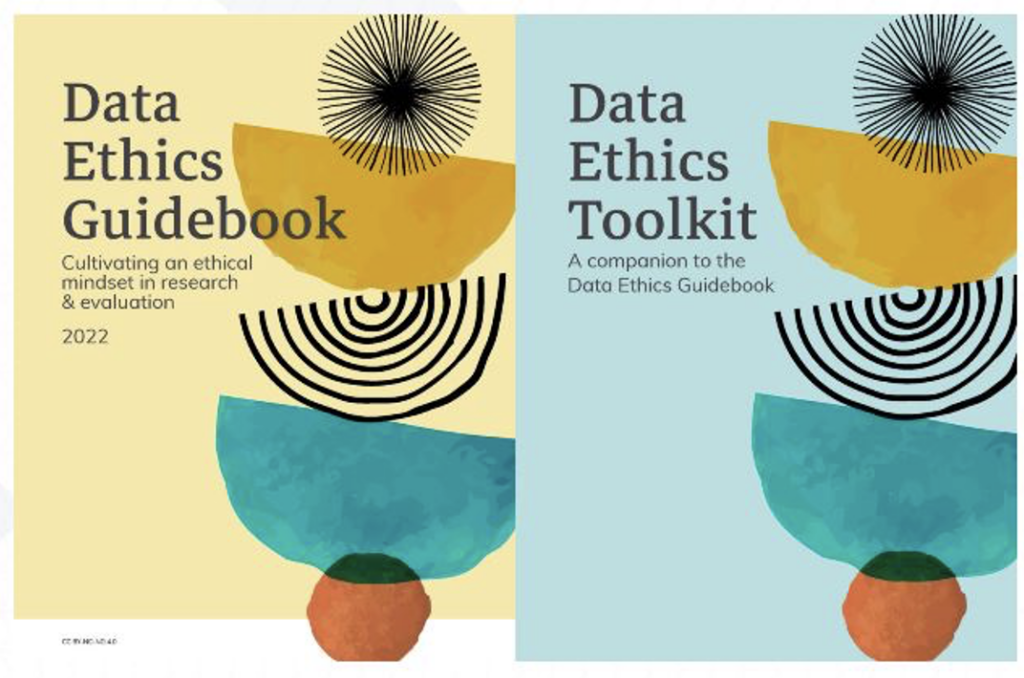Hi AEA365 readers! We are Anjie Rosga and Caitlin Stanton with Informing Change, a strategic learning and evaluation firm based in Berkeley, California. We are excited to kick off Data Ethics Week with a simple question: what is data ethics? In a nutshell, according to the Open Data Institute, it’s “a branch of ethics that evaluates data practices with the potential to adversely impact on people and society—in data collection, sharing, and use.”
When many people think about ethics in research, what come to mind are horrifying abuses of power and violations of human rights, including those at Nuremberg, Tuskegee, and countless other contexts in which data was extracted from people with little to no power to resist it, or even awareness that it was happening, often with egregious and permanent harm to them as a result. Outrage over these abuses and, specifically, organizing and advocacy by those impacted, led to important agreements that now govern research and data collection practices, such as the Nuremberg Code, the Belmont Report, and the principle of Free, Prior, and Informed Consent.
In contemporary evaluation work, taking care to ensure ethical practices are consistently integrated can all too easily become a rote exercise in reducing liability risk. Along the way, data ethics becomes more about compliance and box-checking and less about addressing power imbalances and genuinely engaging research participants in the definition and prevention of harm to them. Additionally, technological advancements that have made it easier for personal data to be tracked, collected, and shared both knowingly and unknowingly have raised a fresh set of concerns about data ownership and privacy that extend into social sector research and evaluation.
Recognizing these challenges, The David and Lucile Packard Foundation charged us with developing a contemporary Data Ethics Guidebook that would be useful and practical to people working in social sector evaluation settings. As we developed this Guidebook and its companion Toolkit, we saw time and again the ways in which conducting evaluations ethically doesn’t just make the practice of evaluation safer for all involved, it also improves the quality of evaluation itself.
Rad Resources:
A free data ethics resource in two parts provides practical resources for individuals, teams, and organizations seeking to strengthen their ethical thinking muscles and identify what they might want to do differently to center the needs, interests, questions, and wisdom of participants in their work.

These resources discuss both basic principles and the more complex issues that emerge in the day-to-day ethical challenges that occur in the work of foundations and nonprofits.
Lessons Learned:
Together, the Guidebook and Toolkit aim to encourage complex ethical thinking and nuanced discussions about contexts and trade-offs. At the highest level, they carry this wisdom from the field:
- The toughest and most important data ethics questions have no easy or clear answers. Going beyond the deceptively simple maxim to “do no harm,” to actively build care and add value for evaluation participants is an aspiration many hold but are still working to achieve.
- Nonetheless, it is essential to meet the basic principle of “do no harm” first. Furthermore, “harm” should be defined by those at risk of it, rather than (solely) by researchers or the commissioners of evaluation.
“Data ethics is a mindset, rather than a checklist.”
Twisha Mehta, Humanity United
The American Evaluation Association is hosting Data Ethics Week.Would you like to submit an AEA365 Tip? Please send a note of interest to AEA365@eval.org. AEA365 is sponsored by the American Evaluation Association and provides a Tip-a-Day by and for evaluators. The views and opinions expressed on the AEA365 blog are solely those of the original authors and other contributors. These views and opinions do not necessarily represent those of the American Evaluation Association, and/or any/all contributors to this site.
